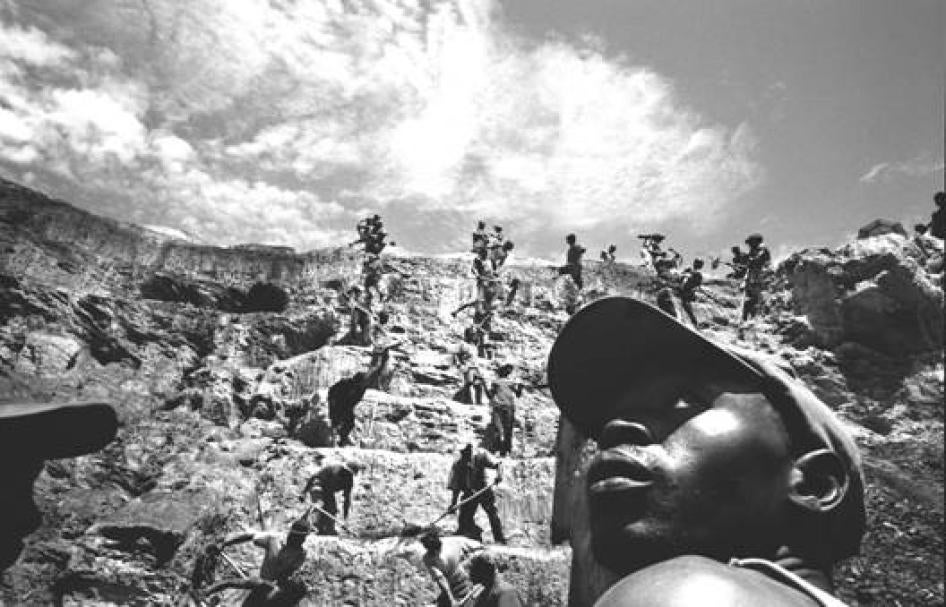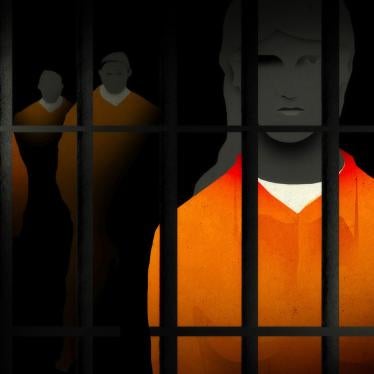(Johannesburg, June 2, 2005) — The lure of gold has fuelled massive human rights atrocities in the northeastern region of the Democratic Republic of Congo, Human Rights Watch said in a new report published today. Local warlords and international companies are among those benefiting from access to gold rich areas while local people suffer from ethnic slaughter, torture and rape.
The 159-page report, “The Curse of Gold,” documents how local armed groups fighting for the control of gold mines and trading routes have committed war crimes and crimes against humanity using the profits from gold to fund their activities and buy weapons. The report provides details of how a leading gold mining company, AngloGold Ashanti, part of the international mining conglomerate Anglo American, developed links with one murderous armed group, the Nationalist and Integrationist Front (FNI), helping them to access the gold-rich mining site around the town of Mongbwalu in the northeastern Ituri district.
The Human Rights Watch report also illustrates the trail of tainted gold from the Democratic Republic of Congo (DRC) to neighboring Uganda from where it is sent to global gold markets in Europe and elsewhere. The report documents how a leading Swiss gold refining company, Metalor Technologies, previously bought gold from Uganda. After discussions and correspondence with Human Rights Watch beginning in December 2004, and after the report had gone to press, the company announced on May 20 that it would suspend its purchases of gold from Uganda. The Metalor statement was welcomed by Human Rights Watch.
“Corporations should ensure their activities support peace and respect for human rights in volatile areas such as northeastern Congo, not work against them,” said Anneke Van Woudenberg, senior researcher on DRC at Human Rights Watch. “Local warlords use natural resources to support their bloody activities. Any support for such groups, whether direct or indirect, must not continue.”
In contravention of international business standards and the company’s own code of conduct, AngloGold Ashanti provided meaningful financial and logistical support – which in turn resulted in political benefits - to the FNI and its leaders, a group responsible for some of the worst atrocities in this war-torn region. In correspondence with Human Rights Watch, AngloGold Ashanti stated there was no “working or other relationship with the FNI” but it said that it had made certain payments in the past to the FNI, including one in January 2005 that was made under “protest and duress.” AngloGold Ashanti also said that any contacts with the FNI leadership were “unavoidable.”
Human Rights Watch researchers documented meetings between the company and the armed group leaders. The self-styled president of the FNI, Floribert Njabu, told Human Rights Watch, “The government is never going to come to Mongbwalu. I am the one who gave [AngloGold] Ashanti permission to come. I am the boss of Mongbwalu. If I want to chase them away, I will.”
AngloGold Ashanti started preparations for gold exploration activities in Mongbwalu in late 2003. The company won the mining rights to the vast gold concession in 1996 but, hampered by the ongoing war, postponed activities there until a peace agreement was signed and a transitional government was established in Kinshasa. The central government failed to establish control of Ituri, however, and the areas around Mongbwalu remained in the hands of the FNI armed group.
“As a company committed to corporate social responsibility, AngloGold Ashanti should have waited until it could work in Mongbwalu without having to interact with abusive warlords,” said Van Woudenberg. “Congo desperately needs business investment to help rebuild the country, but such business engagement must not provide any support to armed groups responsible for crimes against humanity.”
From 1 – 3 June, Anglo American is co-chairing the Africa Economic Summit in Cape Town, aimed at promoting business investment and engaging business as a catalyst for change in Africa.
The gold concessions of northeastern Congo, some of the richest in Africa, could help to rebuild Congo’s shattered economy. But according to Human Rights Watch researchers, fighting between armed groups for the control of the gold mining town of Mongbwalu cost the lives of at least two thousand civilians between June 2002 and September 2004. One miner told Human Rights Watch: “We are cursed because of our gold. All we do is suffer. There is no benefit to us.”
Throughout the conflict, artisanal mining has continued. Millions of dollars worth of gold are smuggled out of Congo each year some of it destined for Switzerland. The Swiss refining company, Metalor Technologies, bought gold from Uganda. Asked about these purchases by Human Rights Watch on April 21, 2005, Metalor stated it believed “the gold…was of legal origin.” But since Uganda has almost no gold reserves of its own, a significant amount of the gold purchased by the company was almost certainly mined in Congo. In its public statement of May 20, Metalor said it would not accept any further deliveries from Uganda until the company could clarify Uganda’s position and statistics on gold production and export.
“We hope other companies will follow the lead set by Metalor,” said Van Woudenberg. “The problems we have documented are not unique to Congo, nor to one international company. Rules governing corporate behavior must be enforced, otherwise they are meaningless.”
In August 2003, a group of United Nations experts adopted a set of draft human rights business standards, known as the U.N. Norms, which signaled a growing consensus on the need for standards on corporate responsibility, but they have not yet been widely implemented by companies. The international community has also failed to effectively tackle the link between resources exploitation and conflict in Congo, choosing to ignore previous U.N. reports that highlighted the issue.
Northeastern Congo has been one of the worst hit areas during Congo’s devastating five-year war. Competing armed groups carried out ethnic massacres, rape and torture in this mineral-rich corner of Congo. A local conflict between Hema and Lendu ethnic groups allied with national rebel groups and foreign backers, including Uganda and Rwanda, has claimed over 60,000 lives since 1999, according to United Nations estimates. These losses are just one part of an estimated four million civilians dead throughout the Congo, a toll that makes this war more deadly to civilians than any other since World War II.
“Efforts to make peace in Congo risk failure unless the issue of natural resource exploitation and its link to human rights abuses are put at the top of the agenda,” said Van Woudenberg “Congolese citizens deserve to benefit from their gold resources, not be cursed by them.”
Quotes from The Curse of Gold
Witness of atrocities by the UPC armed group in a village near to Mongbwalu:
I saw many people tied up ready to be executed. The UPC said they were going to kill them all. They made the Lendu dig their own graves… [then] they killed the people by hitting them on the head with a sledgehammer.
Witness in Mongbwalu:
When the UPC were in Mongbwalu they sent their gold to Bunia and from there it was sent to Rwanda. In exchange they got weapons.
A witness to the burning of Hema women accused of being witches by the FNI armed group:
The strategy was to close them in the house and burn it. They captured the women from the surrounding countryside. They said it was to bring them to talk about peace. They put ten women in a house, tied their hands, closed the doors, and burned the house. This lasted about two weeks, with killing night and day.
A young gold trader tortured for failure to pay taxes to the FNI armed group:
There I spent two days in a hole in the ground covered by sticks. They took me out of the hole to beat me. They tied me over a log and then they took turns hitting me with sticks - on my head, my back, my legs. They said they were going to kill me.
A witness to forced labor:
The FNI combatants come every morning door-to-door. They split up to find young people and they take about sixty of them to the river to find the gold… They are forced to work. If the authorities try to intervene they are beaten.
A victim of torture by General Jerome:
They said the gold was for Commander Jérôme and he needed money to build his house. They said if I didn’t give the money, Jérôme would give the order for me to be killed. On the fifth day Jérôme came with his officers to the prison . . . and pointed his gun at me. He said: “Since the first day, I said I would kill you. I don’t joke. Today it’s the end of your life.” They made me get out of the hole and lie down. Jérôme loaded his revolver and put it to the back of my neck.
Mining engineer in the Durba gold mining region where the Ugandan army had been present:
The Ugandan army were responsible for the destruction of Gorumbwa [gold] mine. They started to mine the pillars. It was disorderly and very widespread. People were killed when the mine eventually collapsed. It was not their country so they didn’t care about the destruction.
A gold trader asked why he worked in the dangerous mines:
“Tell me what choice I have? This is the only way I can make any money. Its about my own survival and that of my family.”
A Congolese government official:
“We just watch our country’s resources drain away with no benefit to the Congolese people.”
Charles Carter, Vice President at AngloGold Ashanti:
The company has made preparations to “commence exploration drilling on the Kimin prospect [OKIMO] in the Ituri region of the DRC…[W]hile this is obviously a tough environment right now, we are looking forward to the opportunity to fully explore the properties we have in the Congo, believing that we now have access to potentially exciting growth prospects in Central Africa."
Local observer to events in the mining regions:
“Njabu [President of the FNI] now has power due to the gold he controls and [the presence of] AngloGold Ashanti. This is his ace and he will use it to get power in Kinshasa.








